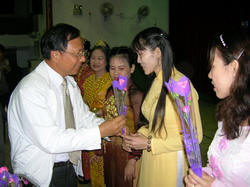Welcoming a New Century of Diverse Cultures and Peoples

MOE Minister Tu Cheng-sheng indicates that in recent years, the immigration of foreign spouses has turned Taiwan into a diverse society with different ethnic groups. Now one out of every 7.5 children is born to a foreign spouse and the government has been taking care of these new immigrants. Each year the government spends $300 million to assist foreign spouses in learning the local language and culture of Taiwan and offers their children after-school learning assistance.
Minister Tu says, in order to provide foreign spouses with better care, MOE is offering educational assistance to foreign spouses in accordance with the Executive Yuan's 'Program for Handling Current Immigration of Foreign and Mainland Chinese Spouses' and the Ministry of the Interior's 'Measures to Care for and Assist Foreign and Mainland Chinese Spouses'. At the same time, the MOE has drawn up a 'Program for the Development of New Immigrant Culture' to establish and solidify a system and channels of lifelong learning for foreign spouses.
After much hard work over recent years, the MOE's policies for caring for new Taiwanese citizens are beginning to achieve their desired results. In terms of establishing a lifelong learning system for foreign spouses, Minister Tu referred to the achievements made in the last two years and pointed out that in 2005, 786 basic education classes for foreign and Mainland Chinese spouses were sponsored by local governments and subsidized by the central government with 15720 participants. At the same time, foreign and Mainland Chinese spouses were also allowed admittance into extension schools and continuing education schools at primary and junior high schools.
Minister Tu adds that, on request of the MOE, experts and academics of various branches of learning have pooled their expertise to develop different kinds of teaching materials and plans for new immigrants based on the needs of people of different nationalities. At the same time, different learning channels have been made available to new immigrants who have different learning needs. In addition, the family education centers of local governments have received subsidies to continue sponsoring family education activities for foreign spouses. In 2005, a total of 908 such activities were held with 35467 participants. These various initiatives that are aimed at satisfying the learning needs of foreign spouses are receiving more and more positive recognition.
In terms of popularizing and solidifying the learning channels for foreign spouses, Minister Tu indicates that MOE in 2005 subsidized course programs in 59 community colleges with programs including subjects on equality of and respect for different peoples. The schools also held over 50 activities aimed at understanding different peoples and cultures. In addition, social education facilities were funded to hold over 100 courses and activities on foreign spouses, education on gender equality, and family education. These have all made significant contributions to helping new immigrants understand cultural diversity.
From a social and cultural viewpoint, Minister Tu says that after arriving in Taiwan , foreign spouses have to be able to adapt themselves to Taiwan 's social environment and do their part in the education of children at home. The most important thing is providing these foreign spouses with channels for learning. In addition to learning the spoken and written language, they need to understand Taiwan 's culture, customs, and religions in order to be able to adapt themselves fully into Taiwan society.
As different cultures are relative and interactive, Minister Tu points out that many foreign spouses are from Southeast Asian countries including Thailand , Indonesia , Myanmar , and Cambodia . These countries have long histories and brilliant cultures. Therefore, foreign spouses not only need to understand Taiwan 's history and culture; Taiwanese people also need to understand the cultures of the native countries of foreign spouses. Everyone must learn from each other and understands each other's culture. In this way, we can expect the emergence of a new Taiwanese culture in our next generation.
Therefore, Minister Tu believes that promoting international days in primary, secondary schools is an important policy for MOE. It allows mothers from different countries to demonstrate the cultures of their native countries by wearing traditional costumes and providing the food and drinks of their native countries. It is hoped that a new culture belonging to Taiwan can be jointly created by learning from each other, appreciating each other's culture and promoting mutual understanding between students.
Attachment(s) for download
- Chinese text Chinese text .doc
